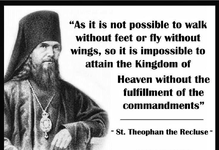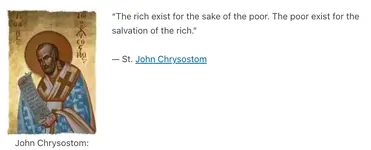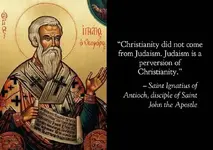You are using an out of date browser. It may not display this or other websites correctly.
You should upgrade or use an alternative browser.
You should upgrade or use an alternative browser.
Edifying Quotes from Church Fathers and Saints
- Thread starter Let God Arise
- Start date
"Behold a multitude of evil spirits are standing about, holding the handwriting of my sins, and they cry out exceedingly, shamelessly seeking my lowly soul."
(The Order at the Parting of the Soul from the Body when one has Suffered for a Long Time, vol 3, Book of Needs, (South Canaan, PA: St. Tikhon Seminary Press, 1999, p. 87).
(The Order at the Parting of the Soul from the Body when one has Suffered for a Long Time, vol 3, Book of Needs, (South Canaan, PA: St. Tikhon Seminary Press, 1999, p. 87).
Once, the father of a girl who had cancer, and whom the doctors told that she had only a few more months to live, came to the Holy Mountain. He brought some of her belongings so that the “Father” could bless them, and asked the Elder to pray for his daughter.
The Elder said to him:
—I shall pray, but you, as a father, should bring some sacrifice to God, for the sacrifice of love greatly “predisposes” God to help.
The father asked:
— What shall I sacrifice, Gheronta? The Elder said:
—What passions do you have? Sacrifice one of them. Not being very spiritual, the father answered:
— I do not know, I have no passion….
Then the Elder asked:
— Do you smoke?
— Yes, — he answered.
— So, give up smoking out of love for your daughter, and then God will cure her.
He promised to do that and, really, gave up smoking. After that, the girl began to recover gradually, until she became completely healthy. The doctors later confirmed her full recovery.
After a while, the father, apparently having forgotten about his vow, started smoking again. At the same time, the cancer began to return to his daughter, so that she found herself in the previous grave state.
Then the father again came to the Holy Mountain and visited the Elder.
The Elder, looking at him sternly, said:
—If you, as a father, do not have enough piety to sacrifice your passion and save the life of your child, then there is nothing I can help you with.
The Elder persistently emphasized the fact, that a man does not have the right to say, “I cannot,” he can only say: “I do not like” or “I do not want.”
When people, overwhelmed by some passion, say, that some force prevents them from doing good, they should know that this force is nothing else but their own force, which is given them for loving, but that began to act in the wrong direction. And, inasmuch as they love their passions, they naturally do not want to cast them off, because you do not wish to lose that which you love.
Consequently, when coming to hate a passion, one should find something better and elevated to replace it with. For, if a man cannot find anything better for himself, he will not know where to direct his love and his forces, and will suffer because of this.
“Very often people came to me and asked:
— Gheronta, I smoke, and cannot give it cigarettes. What should I do?
The Elder asked: — Do you want to give it up?
I hear the answer: — Yes, Gheronta, I tried many times, but in vain.
Then the Elder said: — Yes, it happens! … From this moment on, stop smoking, and God will help you.”
The person, subjected to the passion, normally objects:
— No, Gheronta, I cannot!
Then the Elder, interrupting him before he can finish the phrase, powerfully said:
— There is no “I cannot,” fulfill it and that’s all! Do not give in to the thoughts, which suggest that you will not be able to deal with this habit.
In this way, the Elder instilled in each of us, that we are autocratic. If we became the slaves of some passion, then this happened according to our own will. And, if we remain its slaves, then only through attachment to it, because we are delighted to be in servitude.
But when we fall in love with our freedom and our being with Christ, then from that moment on, when we want it, we become free from passions and become God’s children. This proves, that we are autocratic. Moreover, Christ gave His commandments to ordinary sinners and, consequently, slaves of sin. He commanded them to get freed from the yoke of sin and to come nearer to Him. He said to the fornicator: “Do not sin,” to the thief: “Do not steal,” and to the wrong-thinking: “Do not judge.”
If we were involuntary slaves, then God would not command: “Leave that place and come to Me,” for we would have been unable to fulfill it. Therefore, if He tells us, that we should leave them on our own, this means that we voluntarily submit to our passions, love them and long for them. But at the moment that we start hating them and turn our love to God, then we are immediately freed.
Thus, it is necessary to:
- realize, that we voluntarily gave ourselves to passions and are therefore sick,
- hate our passion, which is destroying us,
- love God and virtues.
When the foolish thought of counting up any of your good works enters into your head, immediately correct your fault and rather count up your sins, your continual and innumerable offenses against the All-merciful and Righteous Master, and you will find that their number is as great as the number of grains of sand in the sea, while your virtues in comparison with them are as nothing.
- Saint John of Kronstadt
- Saint John of Kronstadt
"...the very concept of “anger” in relation to God is conditional and anthropomorphic, as we learn from the teaching of St. Anthony the Great, who says:
“God is good, dispassionate and immutable. Now someone who thinks it reasonable and true to affirm that God does not change, may well ask how, in that case, it is possible to speak of God as rejoicing over those who are good and showing mercy to those who honor Him, while turning away from the wicked and being angry with sinners. To this it must be answered that God neither rejoices nor grows angry, for to rejoice and to be offended are passions; nor is He won over by the gifts of those who honor Him, for that would mean He is swayed by pleasure.... He is good, and He only bestows blessings and never does harm, remaining always the same. We men, on the other hand, if we remain good through resembling God, are united to Him; but if we become evil through not resembling God, we are separated from Him. By living in holiness, we cleave to God; but by becoming wicked we make Him our enemy. It is not that He grows angry with us in an arbitrary way, but it is our own sins that prevent God from shining within us, and expose us to the demons who punish us. And if through prayer and acts of compassion we gain release from our sins, this does not mean that we have won God over and made Him change, but that through our actions and our turning to God we have cured our wickedness and so once more have enjoyment of God’s goodness. Thus to say that God turns away from the wicked is like saying that the sun hides itself from the blind” (Philokalia, vol. 1, p. 352)."
-Orthodox Dogmatic Theology (Fr. Michael Pomazansky)
“God is good, dispassionate and immutable. Now someone who thinks it reasonable and true to affirm that God does not change, may well ask how, in that case, it is possible to speak of God as rejoicing over those who are good and showing mercy to those who honor Him, while turning away from the wicked and being angry with sinners. To this it must be answered that God neither rejoices nor grows angry, for to rejoice and to be offended are passions; nor is He won over by the gifts of those who honor Him, for that would mean He is swayed by pleasure.... He is good, and He only bestows blessings and never does harm, remaining always the same. We men, on the other hand, if we remain good through resembling God, are united to Him; but if we become evil through not resembling God, we are separated from Him. By living in holiness, we cleave to God; but by becoming wicked we make Him our enemy. It is not that He grows angry with us in an arbitrary way, but it is our own sins that prevent God from shining within us, and expose us to the demons who punish us. And if through prayer and acts of compassion we gain release from our sins, this does not mean that we have won God over and made Him change, but that through our actions and our turning to God we have cured our wickedness and so once more have enjoyment of God’s goodness. Thus to say that God turns away from the wicked is like saying that the sun hides itself from the blind” (Philokalia, vol. 1, p. 352)."
-Orthodox Dogmatic Theology (Fr. Michael Pomazansky)
Jeremiah Branch
Orthodox Catechumen
"The goal of reading is the application, in our lives, of what we read. Not to learn it by heart, but to take it to heart. Not to practice using our tongues, but to be able to receive the tongues of fire and to live the mysteries of God.
"If one studies a great deal in order to acquire knowledge and to teach others, without living the things he teaches, he does no more than fill his head with hot air. At most he will manage to ascend to the moon using machines. The goal of the Christian is to rise to God without machines."
-- St. Paisios the Athonite
"If one studies a great deal in order to acquire knowledge and to teach others, without living the things he teaches, he does no more than fill his head with hot air. At most he will manage to ascend to the moon using machines. The goal of the Christian is to rise to God without machines."
-- St. Paisios the Athonite
Jeremiah Branch
Orthodox Catechumen
You ask, "Must one do something?" Of course one must! And do whatever comes along— in your circle of friends and in your surroundings—and believe that this is and will be your real work. More will not be demanded of you.
It is a great misconception to think, whether for the sake of heaven or, as the modernists put it, to "make one's mark on humanity,” that one must undertake great, reverberating tasks. Not at all. It is necessary only to do everything according to the commandments of God. Just what exactly? Nothing in particular - only those things which present themselves to everyone in the circumstances of life, those things which are required by the every day happenings we all encounter. This is how God is.
God arranges the fate of each man, and the whole course of one's life is also the work of His most gracious foreknowledge, as is, therefore, every minute and every encounter. Let's take an example: a beggar comes up to you; it is God who has brought him. What should you do? You must help him. God has brought the beggar, of course, desiring you to act toward this beggar in a manner pleasing to Him, and He watches to see what you will actually do. If you do what is pleasing to God, you will be taking a step toward the ultimate goal, the inheritance of heaven.
Generalize this occurrence, and you find that in every situation and at every encounter one must do what God wants him to do. And we know truly what He wants from the commandments He has given us. If someone seeks help, then help him. If someone has offended you, forgive him. If you yourself have offended someone, then hasten to ask forgiveness and to make peace.
-- St. Theophan the Recluse. Letter to a Young Girl. (Quoted in The Bible and The Holy Fathers for Orthodox, Tuesday, 25th week after Pentecost, p. 516)
It is a great misconception to think, whether for the sake of heaven or, as the modernists put it, to "make one's mark on humanity,” that one must undertake great, reverberating tasks. Not at all. It is necessary only to do everything according to the commandments of God. Just what exactly? Nothing in particular - only those things which present themselves to everyone in the circumstances of life, those things which are required by the every day happenings we all encounter. This is how God is.
God arranges the fate of each man, and the whole course of one's life is also the work of His most gracious foreknowledge, as is, therefore, every minute and every encounter. Let's take an example: a beggar comes up to you; it is God who has brought him. What should you do? You must help him. God has brought the beggar, of course, desiring you to act toward this beggar in a manner pleasing to Him, and He watches to see what you will actually do. If you do what is pleasing to God, you will be taking a step toward the ultimate goal, the inheritance of heaven.
Generalize this occurrence, and you find that in every situation and at every encounter one must do what God wants him to do. And we know truly what He wants from the commandments He has given us. If someone seeks help, then help him. If someone has offended you, forgive him. If you yourself have offended someone, then hasten to ask forgiveness and to make peace.
-- St. Theophan the Recluse. Letter to a Young Girl. (Quoted in The Bible and The Holy Fathers for Orthodox, Tuesday, 25th week after Pentecost, p. 516)
"You will achieve only one thing - either victory over the enemy or your defeat, you will either be abiding in God, or cut off from Him. You will be saved, or you will perish. There are no other choices."
- Saint Dimitry of Rostov
- Saint Dimitry of Rostov
“Faith without works is worthless (cf. Jas 2:20), and in vain does one who is not adorned with good works flatter oneself for faith alone.”
+ St. Isidore
+ St. Isidore










